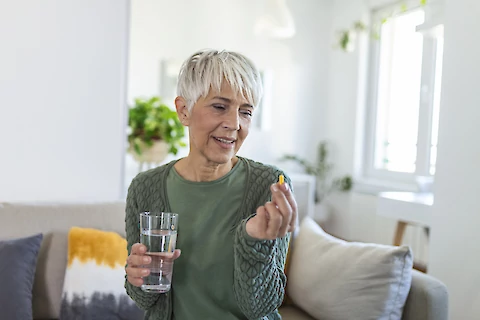
For seniors, maintaining overall health becomes increasingly important, and one key factor in staying healthy is ensuring they get the right vitamins and minerals. Vitamin D, in particular, plays a crucial role in many aspects of your well-being, especially for seniors.
This article will address some frequently asked questions about Vitamin D, its importance, and its unique benefits for seniors. Remember that this information does not replace professional medical advice but will help you become better informed and more in control of your health. So, let's dive in and explore everything you need to know about Vitamin D for seniors.
Do Seniors Need More Vitamin D as They Age?
As people age, their skin becomes less efficient at producing Vitamin D, which may lead to decreased levels in the body. Additionally, seniors may experience reduced exposure to sunlight and may not consume enough Vitamin D-rich foods. Therefore, they may need to pay attention to their Vitamin D intake as they age. Take note, the recommended daily intake of Vitamin D for adults above 70 years of age is 800 international units (IU) per day, compared to 600 IU for those aged 51-70.
What Are the Unique Benefits of Vitamin D for Seniors?
Vitamin D offers several health benefits specifically for seniors, including:
- Prevention of osteoporosis and fractures: Adequate Vitamin D levels are essential for maintaining strong bones and preventing age-related bone loss. It helps the body absorb calcium, which is crucial for bone health.
- Reduced risk of certain cancers: Some studies suggest that Vitamin D may play a role in reducing the risk of certain types of cancer, such as colon, breast, and prostate cancer.
- Improved cognitive function: Research indicates that Vitamin D may positively impact cognitive function, with some studies linking higher Vitamin D levels to a reduced risk of dementia and Alzheimer's disease.
Can Seniors Take Too Much Vitamin D?
Taking too much Vitamin D is possible and sometimes, it may not be good.
Vitamin D toxicity, also known as hypervitaminosis D, is a rare but severe condition that occurs when the body has excessively high levels of Vitamin D. Symptoms of Vitamin D toxicity include nausea, vomiting, weakness, and kidney problems. To avoid these risks, check with a doctor to see how much Vitamin D your senior loved one should take. Most people should not exceed the recommended daily intake of Vitamin D. However, those with a deficiency or absorption problem may need significantly higher doses of the vitamin.
Does Sunlight Typically Provide Enough Vitamin D for Seniors?
Sunlight plays a significant role in the body's ability to produce Vitamin D, as our skin synthesizes it when exposed to the sun's ultraviolet B (UVB) rays. However, several factors may affect the amount of Vitamin D produced from sunlight, including skin type, geographic location, and time of day.
For seniors, reduced sun exposure and decreased skin efficiency in making Vitamin D may mean that sunlight alone can’t provide adequate amounts. This means that they must balance safe sun exposure with other sources of Vitamin D, such as diet and supplements.
What Are the Best Food Sources of Vitamin D for Seniors?
Several foods that help seniors increase their Vitamin D intake include:
- Fatty fish, such as salmon, tuna, and mackerel
- Fortified foods, like milk, orange juice, and cereals
- Beef liver
- Cheese
- Egg yolks
Incorporating these foods into a balanced diet can help seniors ensure they're getting enough Vitamin D.
Should Seniors Take Vitamin D Supplements?
In some cases, seniors may benefit from vitamin D supplements to meet their daily requirements. However, it's important to discuss supplementation with a healthcare provider to determine the appropriate dosage and ensure there are no potential interactions with other medications. If your senior loved one’s doctor recommends a supplement, look for products with the USP (United States Pharmacopeia) seal to ensure quality and purity standards.
How Can Caregivers Help Seniors Maintain Adequate Vitamin D Levels?
Caregivers play an essential role in supporting seniors' efforts to maintain adequate Vitamin D levels by:
- Encouraging a balanced diet that includes Vitamin D-rich foods
- Assisting with safe sun exposure, such as taking short walks outdoors or sitting near a window
- Monitoring for signs of deficiency or toxicity and discussing any concerns with a healthcare provider
We Want to Help
Vitamin D is crucial for seniors, offering various benefits for their overall health and well-being. By understanding the importance of Vitamin D, its unique benefits for seniors, and how to maintain adequate levels, you will help your senior loved one better manage their health. Always consult a healthcare provider for personalized advice on Vitamin D and other health matters.
If you live in Chandler, Gilbert, Tempe, Ocotillo, Sunlakes, or Santan, Senior Helpers Chandler-Gilbert is here to help. Our compassionate team offers comprehensive in-home care services for seniors to support their health and well-being. Contact us today to learn more about how we will help your loved one in living their best life.